- Home
- Sonya Hartnett
What the Birds See Page 6
What the Birds See Read online
Page 6
“What have you been doing, anyway?”
He blinks. “Nothing. Just going to school… Did you go to school today?”
His neighbour rolls her eyes skyward and drawls, “What do you reckon?”
Adrian shrugs, hopelessly confused. Joely is touching her nose with her tongue, chin tilted to the clouds. Giles gazes at nothing with the absent expression of the bored toddler; he balls a hand into his sister’s palm and hangs his weight off it, sleepily closing his eyes. The ironwork contorts round the faces of the children, frames them with wrestling coils. The evening has come down heavily, a haze of pearly grey. Few cars travel this nowhere road, and the cold birds are all silent. Adrian comes cautiously forward, touching his wrists to iron. His lips and eyelids feel like icy wounds, his breath lingers under his nose. He hears himself asking, “Where did you come from?”
Nicole flicks an eyebrow. “From the moon.”
Joely chuckles, liking this. “The moon,” she chuffs. Giles continues to stand like a statue. Adrian smiles. “Where do you really come from?”
“I told you, the moon.”
Joely snorts with mirth. “I come from the moon too,” Adrian tries.
“Oh yeah? I never saw you there.”
He bobs his head, knowing when he’s defeated. “Will you stay on Earth for ever?”
“Until we go to Heaven.” It’s a silly answer, but Adrian is satisfied; Nicole and Joely are giggling. A sound makes the three of them look round, laughter freezing in their eyes. The front door of Nicole’s house has opened and a man is standing there. It’s the same man who shooed Nicole into the car that morning she waved at Adrian. An arrow of wariness spears through him, and Adrian steps away from the fence.
“Inside,” the man says flatly; he stares at Adrian as he speaks. “Come and eat.”
The words could be an invitation, or command. Adrian takes blind backward steps to the gutter. Nicole hoists Giles to her hip and marches with Joely into the house; the door shuts behind them with a thump and clink of chain. It happens so quickly that Adrian is dazed to find himself alone in the dusk, standing in the gutter on the tips of his toes. He steps backward to the centre of the road, considering the blank door and vacant yard; a moment moves slowly by before he turns and trots for home. From the corner of an eye he glimpses the curtain sway in the bay window of the Jeremios’ house – every street has its busybody, its lunatic-fringe dweller, and this street has Mrs Jeremio. Adrian feels her eyes crawl like bugs on his back; he runs.
FIVE
There are, of course, many rumours going round. Most of them are absurd, and those who spread them feel vaguely ridiculous doing so. Nevertheless the stories disperse, and there’s horrible pleasure to be had in hearing something one hasn’t heard before.
Inevitably the first theory has a religious theme. The Metford family are members of a cult. Where cults are, there’s sacrifice.
Quick on those unholy heels comes slavery. The children are gone, their identities scrubbed, there’s blindfolds on their eyes.
It’s said that the police are in daily communication with the Thin Man. The cops are receiving letters, hair, slivers of skin. There’s talk of a ransom that the Metfords have been unable to meet. There’s also rumour that bodies were found days ago, and that the continuing search and flashing of photos is a ruse meant to distract the public.
Another story, quick to surface, claims that Veronica, Zoe and Christopher never existed – that they themselves are a hoax. There’s a political aspect to this theory which is never satisfactorily explained.
There’s alien abductions; there’s ordinary old running-away-from-home.
No one believes a word of these tales. One night, on a railway bridge spanning a busy thoroughfare, four white words are painted in a dripping but steady hand: Suffer the little children. The following morning, three pink rosebuds bound by a white ribbon are left lying on the walkway below the bridge. From that day onward, the path grows into an alley of flowers.
Beattie takes Adrian shopping for clothes on Saturday, towing him by the hand through the bustling morning crowds. The boy clearly puts the excursion on a par with visiting the dentist, is unwilling and morose. Beattie, as she drags him, details how thrilled she would have been, as a girl, if her own mother had taken her to a lovely department store to buy dresses and bows and things. Adrian listens, but only because he can’t avoid doing so. He remains steadfastly detached. When he does eventually see something that’s slightly less tedious than everything else, Beattie is quick to find fault with his choice. She shames him by wrenching at stitching and scoffing at seams – “It’s a waste of time looking for quality these days.” She does not want him owning clothes that are merely fashionable – she can’t afford to let him be like Clinton, indulged with everything he sees on TV. If she must buy clothes for a relentlessly growing child, they will at least be quality items that please her eye. Adrian, however, is unimpressed by sturdy buttons and generous hems. He wants a navy-blue duffel-coat (“You want to dress like a wharfie, is that right?”), but his grandmother knows his parka will suffice the rest of the winter. At the sight of his glum face she scolds, “Stop being such a sad-sack.”
Rory has given his nephew a few dollars and in the toy department the boy brightens considerably, deliberating over junky trinkets. “Buy a book,” Beattie advises, but the suggestion fails to inspire. He scans the shelves of boardgames hungrily, running his fingers over the desirable boxes of Mouse Trap, Operation and Ker-Plunk!, all of which are well beyond his meagre financial reach. “Maybe for your birthday,” Beattie consoles, though she knows it will be she who’s forced to play the games with him, that she’ll always prefer to be doing something else, that he’ll grow quickly frustrated with her inability to remember the rules or to take the combat seriously. Finally he chooses a pile of metal, showing her how the coils can be poured like liquid from one hand to another, making as they do so a rather musical noise. “What do you call it?” she asks, and he chirps, “Slinky.”
Slinky. Someone’s making a fortune from factory off-cuts. When he’s paid for and received the toy in a bag, she takes him to the store’s cafeteria as a treat. From the array of desserts she selects for herself a slice of lemon meringue pie. Adrian, who’s inherited the McPhee sweet tooth, sets a bowl of chocolate mousse on his own plastic tray. They sit at a table by the mirror-lined wall and while Beattie rummages through the things she’s bought he entertains himself by picking chocolate shavings from atop a blob of cream and sucking them down one by one. He hardly bothers to look up when she unfolds his new jumper and admires the pattern cut in the velour.
Sitting at tables throughout the cafeteria are other grandparents having morning tea with other grandchildren. In most cases the children’s mother is present too – the tabletop that separates Adrian and herself is as broad, Beattie muses, as a missing generation. Most of the grandparents won’t be taking their grandchildren home with them – at any rate, not for keeps. Most of the grandmothers don’t look into the future and see homework and hormones for years.
The meringue pie verges on the stale, but she will not complain. She’ll put up with anything rather than complain. She was reared not to make a spectacle of herself. She glances into the mirrored wall and sees a creased face, snowy hair. Beattie is sixty, the wrong side of middle-aged; lately she has started dressing in the dowdy styles worn by her own mother in her declining years. Living with a child has not kept Beattie young – on the contrary, the past ten months have aged her disproportionately. She gives her reflection a wry smile, but she isn’t amused.
She catches him studying her, big-eyed. “What’s up with you?”
The boy smiles briefly. “You’re making a noise.”
“What? What?”
“When you chew.” He hunkers in his seat. “You make a funny noise when you chew.”
She slobbers her tongue over her gums horribly and the child at once blushes and grows pale. “Boys who are nasty find their own
way home,” she tells him, and he glances whitely away. She watches him a minute, thinking it is strange – strange how love coexists with hate, how they render one another mute, how the swilling of them together makes a new and softer, sympathetic thing.
Still, she thinks, at least Adrian is well-behaved. Looking around the restaurant, some of these brats she could throttle. Children nowadays aren’t often taught about making a spectacle.
They leave the store before the bell rings to mark midday closing time, because she knows her grandson’s fears. On the drive home he’s in good spirits, the worst of the day being done. He is clearly pleased with his purchase of the Slinky and when they arrive at the house he runs inside to show it to Rory, abandoning the clothes in the car.
The afternoon is dry and warm, and he sprawls across the swing-seat playing idly with the new toy. From the high front veranda he has a view of the garden and the joint of the roads, but for much of the time there’s nothing worth seeing or watching. Eventually, however, the flyscreen door of his neighbour’s house opens and Joely rambles into the yard. She is carrying what seems to be a baby but proves, on closer inspection, to be a doll: she offers to let Adrian nurse it in exchange for a turn with the Slinky, an offer he cannot accept. But he hands the Slinky over and instructs her on its use, and they crouch side by side on the sunny driveway flipping the coils head over tail, tail over head. The light is speedy mercury that loops and loops the toy. Joely slides the coils along her arm, wearing them like bangles. She has stubby fingers, smells faintly of spilled food. “Are you always going to live here?” Adrian asks.
She screws up her lamblike face and laughs. “Have to live somewhere.”
“You should stay,” he says sombrely.
Nicole interrupts them, barging from the house. She stands at the gate, arms folded. “What are you doing?”
“Nothing…”
“Look!” Joely shakes the Slinky so the coils rattle. Nicole marches nearer and takes the toy from her. Adrian watches uneasily as she bounces the spring up and down a few times.
“A girl at school has one of these.”
He nods; then feels he must add, “I only got mine today.”
“What will you swap for it?”
Adrian is taken aback. “I can’t swap. My uncle bought it for me.”
Nicole folds cross-legged onto the driveway and the children crawl close to her. She reaches into the neck of her windcheater and draws up a string of black leather. “What if I swap it for this?” she asks, supremely confident.
At the end of the string hangs a serrated white triangle. It wears a cap of silver and a shiny looping clasp. Joely gasps. “Not your shark’s tooth!”
Nicole gives the tooth a tempting jiggle. Adrian feels its desirability like heat on his face. Clinton does not have a shark’s tooth, although he’d dearly love one. Adrian hesitates, shielding the Slinky in his hands. “I don’t know … I only got it today. It’s brand-new.”
Nicole narrows raven eyes. Her trousers have ridden up her calves, allowing a giddying glimpse of candy-striped socks. Joely hunches forward, deeply interested. Nicole darts a look at the Slinky. She thinks for a moment, licking her lips. She says, “What if I give you my Wombles yo-yo as well?”
Joely catches her breath, flabbergasted. Adrian, however, shies away. “Wombles are for girls!”
“They are not!”
“They are!”
Nicole looks sour, sunlight on her head. “Hurry up and make up your mind!” she sniffs. “The Slinky for my yo-yo and my shark’s tooth necklace. That’s my final offer.”
Adrian grimaces. The necklace is worth having. But the Slinky, too, is enviable; more than that, it’s associated with the satisfaction of choosing for himself. “I don’t think I should,” he says. “My uncle will get angry.”
Nicole screws up her face, disgusted, and returns the tooth to its hiding-place. Joely offers, “I’ll have your Wombles yo-yo if you don’t want it, Nics.”
“I do want it, stupid!”
Adrian has looked up, beyond his neighbour’s shoulder. There is a woman striding purposefully along the footpath towards them and everything in her manner says she will not walk right by. She is about to accost them, her expression determined, her jaw and fists clenched. Nicole notes his apprehension, and twists to see what he sees; in the next moment the woman has swooped upon them. She drops to her knees on the driveway, her arms encircling, her shadow spread wide; she comes down like a crane on the nest. “Don’t be frightened,” she whispers, her words hasty and rasped. “Don’t be frightened now, you’re safe—”
The children are more stunned than scared, and duck from her clutches smiling uncertainly. The woman wears a nylon skirt and Adrian hears the material crackle as it scrapes the concrete. Her arms grapple, wanting them closer, and the children squirm like worms. “Don’t be scared,” the woman murmurs, “I’m not going to hurt you. Tell me your names, little ones—”
Joely bites her lip and whimpers, pressed almost flat to the drive. Adrian tries to get to his feet, to escape the woman’s overhang. He has realized who she is, but cannot say the words. Meanwhile the woman keeps talking, and they’re blown by soupy breath. The gold links around her throat flare warmly with the sun. “I’ll take you to the police station, you’ll all be safe there. Your mother will be so happy. Come, children, stand up, hurry—”
She grips Nicole’s arm, and the girl lets out a wail. Joely immediately bursts into tears. The woman gives a frantic cry, her face creasing with concern. “Hush, hush, darlings! Don’t you want to see your mother?”
“Camille!”
The voice comes from above them; Adrian, scrambling backward, sees his neighbour, Mr Jeremio. Typically a short man, he seems to have become broad-shouldered and huge. “Camille!” he repeats, gently stern.
The woman’s hands, encompassing, hover in the air. She turns her head painstakingly, lifts her trembling chin. Her eyes curve into sad crescents at the sight of her husband. “Joseph,” she says, “look who I’ve found.”
Mr Jeremio slowly shakes his head. Other days he’s reminded Adrian of a sprightly squirrel; today, inexplicably, he is an old lion. “These girls are our tenants, Camille,” he sighs. “Remember? Their papa rented the big house. And look – this is Adrian, from across the road. You know Adrian, don’t you?”
Mrs Jeremio sinks, her distant eyes sliding over the children. Adrian, Nicole and Joely, bunched together on the concrete, gaze back at her tensely. Mrs Jeremio’s lips move, but it takes a moment for her voice to come out. “Yes,” she breathes. “Adrian.”
“These aren’t the ones you’re looking for, Camille.”
“I know.” She smiles nervously. “I know, I know.”
“Their mother isn’t worrying about them.”
“No.” She stands abruptly, brushing flecks from her skirt; a waft of greasy perfume skates along the air. “Go inside now, children,” she says. “You shouldn’t be playing near the road.”
Mr Jeremio steps forward and takes his wife’s elbow. He guides her to the footpath and leads her meekly away. The children perch on the drive and watch the couple leave. Shocked, none of them says anything – except for Joely’s sniffing, they fail to make a sound. They watch while Mr Jeremio guides his wife over the road and into the sanctuary of the house. When the door shuts behind them, Nicole spins to Adrian. “What?” she squawks. “What?”
“She didn’t mean to scare us—”
“I wasn’t scared!” the girl spits. “Who says I was scared?”
“She didn’t know what she was saying, I think…”
Joely’s tears overflow her eyes. “I want Mum…”
“You were scared, not me!”
“I want Mummy,” Joely sobs.
Adrian shakes the Slinky, but the child puts her hands to her face and bawls. The driveway seems suddenly moist and uncomfortable, but they sag there as if lacking bones. “Joely wants her mum,” Adrian acknowledges listlessly. “Where’s her mum
?”
“Where’s yours?” Nicole leaps up, flinging wide her arms, her confusion solidified to rage. “You’re always asking why this, where’s that? Where’s your own mum, stupid? We’re not lost kids, you know!”
She grabs Joely by the scruff and yanks her to her feet; the child howls with terror as she’s roughly hauled away. When the front door’s kicked shut behind the girls, Adrian is alone. His teeth are imprinted along his lip. The sun is still shining, though a bank of pillowy clouds is drifting near. The Slinky capsizes as he gets stiffly to his feet. A stone has dug into his knee, and he picks it out with a fingernail. He hoists his trouser leg and sees that the stone has left behind the shape of itself buried in his skin.
Rory, in a fit of being unable to help himself, once said, “Adrian, your mother is as good as dead.”
Adrian hadn’t understood what his uncle meant – he could see nothing good about death or being dead – but nonetheless he caught the essence, the sense that something had gone very wrong in the life of his poor mother. He hasn’t seen her since coming to live with his grandmother – she hadn’t been at Grandpa’s funeral, though everyone else had been there – because, Gran says, his mother isn’t well. Gran says that it would be upsetting for Sookie, if she were to see her son. Adrian doubts this is true. When he had lived with her, his mother never found the sight of him distressing. Occasionally she’d woken him in the depths of night only to tell him how much she loved him.
Adrian, however, is not completely ignorant. He knows why he’s been taken from her. He doesn’t like putting this reason into words; he dislikes making Sookie bear the blame.
Adrian had walked alone to his first school because his mother could never endure the world at that hour; sometimes when he came home she’d been nowhere to be found. Some weeks there was no money for food shopping, and Adrian would eat honey bread. Sookie often slept on the couch, an ashtray at her elbow, and Adrian would curl on the carpet below her, watching TV and listening to her breathe.

 Butterfly
Butterfly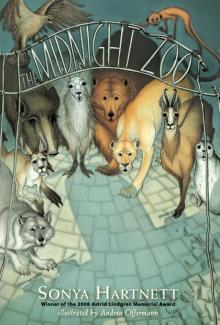 The Midnight Zoo
The Midnight Zoo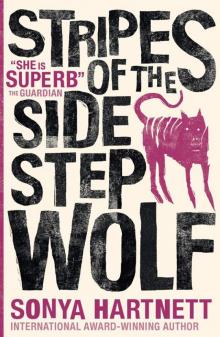 Stripes of the Sidestep Wolf
Stripes of the Sidestep Wolf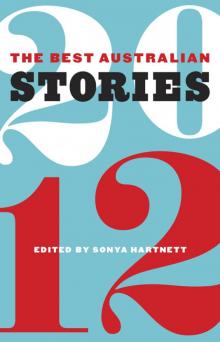 The Best Australian Stories 2012
The Best Australian Stories 2012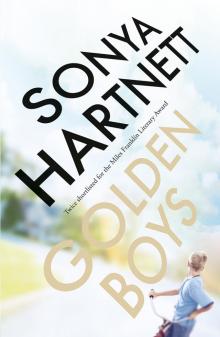 Golden Boys
Golden Boys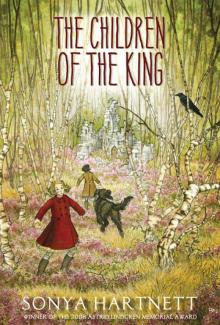 The Children of the King
The Children of the King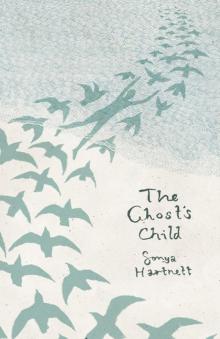 The Ghost's Child
The Ghost's Child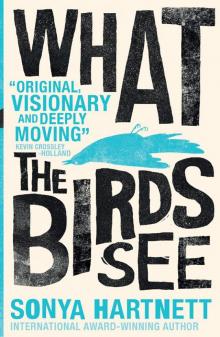 What the Birds See
What the Birds See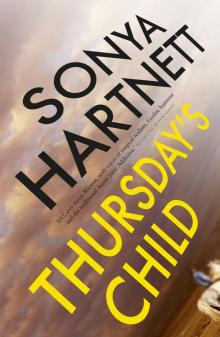 Thursday's Child
Thursday's Child